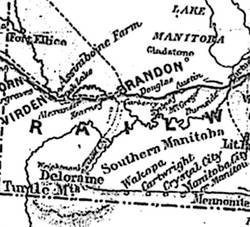In the summer of 1883 English writer and traveler, William Henry Barneby set out to tour the newly opened lands in western North America. His objective was to collect information about farming and settlement in order to “assist those in England who might be thinking of seeking a new home across the Atlantic.”
His wanderings took him across the western states of the U.S., through British Columbia and across the prairies. When he arrived at Manitoba from the west, he turned south at Brandon to examine the newly-settled land between that new city and the U.S. Border.
Along the way he stayed for a night at Mrs. Weightman’s Stopping House. It was a few kilometers northeast of where Dand would be located some years later.
In a volume entitled “Life and Labour in the Far, Far West”, in a chapter entitled, “By Road to Cartwright”, Mr. Barneby tells of arriving at Mrs. Weightman’s about 8:30 in the evening and asking permission to, “put up for the night.”

He describes the hospitality, as supper was prepared and tea was poured, and notes that some additional provisions were supplied by the travellers. He mentions that the Weightmans had been here about a year and offered the opinion that, “she herself (Mrs. Weightman) did not care much about the country, but she said her sons liked it.”
He praised her homemaking, noting that “There was plenty of china and everything was very clean”.
Today’s traveller might find his description of the sleeping arrangements interesting.
“We made ourselves as comfortable as we could for the night, though the accommodation was of course very limited, there being only one room upstairs. Mrs. Weightman and her eldest daughter slept down below, in the little room adjoining the living room; and the one upstairs room was divided amongst the rest of us in the following rather primitive fashion. One part was separated off by a blanket hung across a beam, and on the farther side of this slept the two younger daughters of the house; the other part of the room was shared by their brother (who had his dog as a bed-fellow), our three selves, and the driver of our wagon. We, however, each got a separate bed so, on the whole, considered that we were rather lucky than otherwise; for it must be remembered that we were out on the open prairie, with no other house within miles of us.”
“The next morning we were up at 4:30 a.m. and soon completed our toilettes. The arrangements for washing were not extensive, and consisted of one iron bowl placed at the foot of the stairs (with holes in the bottom mended with string), and a wooden tub standing by from which to procure water. These served for the ablutions of the whole party. Our breakfast was the usual one of the country – eggs, bacon, and potatoes.”
One is struck by the seeming informality of the transaction. Mr. Barneby doesn’t mention if Mrs. Weightman’s was the destination he had in mind. He doesn’t discuss what payment was made. Did he happen upon her place as one pulls in to a roadside motel that beckons near the end of a long day of driving? That could be, but chances are that he knew about stopping places before he left Brandon, or that the spot was recommended to him by people he met along the way. There were, as yet, no newspapers or other media in which one could look up such information. But in terms of population and settlement, Western Manitoba was a small place in 1883, where everyone indeed did know your name. There weren’t that many options and word-of-mouth would ensure that locals would know about them all.
He seems to have accepted the limitations of frontier accommodations and enjoyed his visit.
. . . . .
Author: Ken Storie
Sources:
Barneby, William Henry (1843-1914) [info]. Life and labour in the far, far West: London & New York: Cassell & Co, 1884 / Peel 1115:
